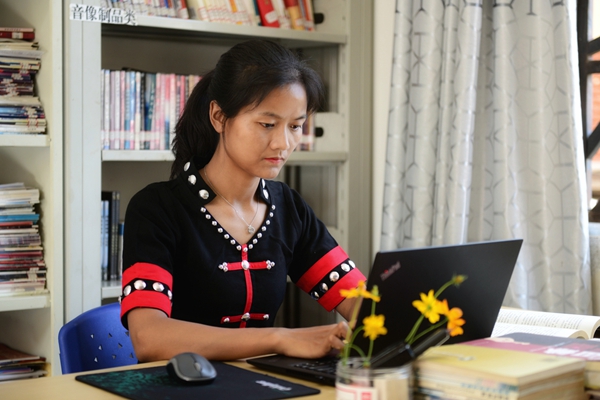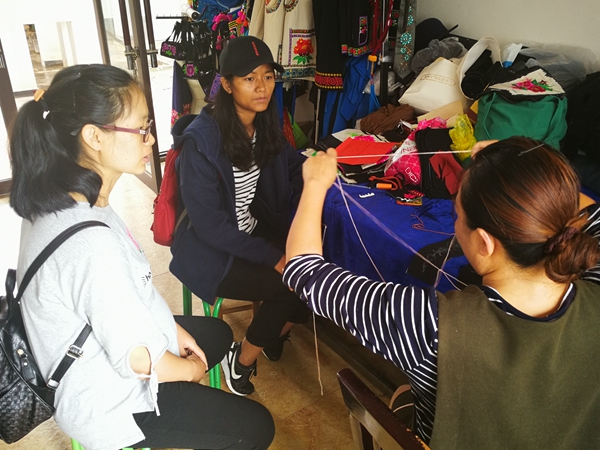Spring Bud Blooms | Project Helps Wa Ethnic Woman Lead Fulfilling Life
Editor's Note
With the care of the Communist Party of China (CPC) Central Committee, and under the leadership of the All-China Women's Federation, the China Children and Teenagers' Fund (CCTF) launched the Spring Bud Project in 1989, to help impoverished girls return to school, and to promote girls' education in disadvantaged areas.
Since the 18th CPC National Congress, in 2012, with the attention and concern of the CPC Central Committee with Comrade Xi Jinping at the core, and with the strong support of Peng Liyuan, special envoy of the Spring Bud Project for promoting girls' education, the project has conducted various activities to care for and support girls, and it has focused on girls' education, safety and health. During the past decade, the project has supported 1.76 million girls, and it has provided one-on-one companionship services and personalized psychological counseling to 133,400 girls. After they receive support from the project, the Spring Bud girls never forget to give back to society. With love and various actions, the girls have demonstrated the Spring Bud spirit of "unremitting self-improvement, striving for excellence, developing stronger virtues and pursuing better lives."
Today, we introduce a new section, Spring Bud Blooms, to share stories about Spring Bud girls who have grown up and become contributing members of society, and to encourage society to care for the development of girls. Ye Heilong is one of them.

With support from the Spring Bud Project, Ye Heilong has become the first individual from the Wa ethnic group in Ximeng Wa Autonomous County, in Pu'er, a city in Southwest China's Yunnan Province, to receive a doctorate. She is now a lecturer at Yunnan University, in Kunming, capital of the province.
Ye says she overcame many difficulties, due in large part to the assistance she had received from many people over the years. Her experience in the pursuit of education reflects the historical transformation of local education in recent decades.
Ye was born in Daigela Village, in Ximeng. When she was a child, the residents made a living by growing crops, and most had a difficult time making ends meet, as yields were generally low. Ye's family was no exception. To save money, she and her classmates in Ximeng Ethnic Primary School often walked several hours to return home on weekends rather than take the bus.
Ye recalls how she was prepared to drop out of school, after she completed middle school, in the summer of 2002.
One day, in July 2002, she received a call from Ximeng Women's Federation, during which she learned, given her outstanding performance on the high school entrance exams, her head teacher had recommended her to study in a Spring Bud class in Kunming. The tuition fees would be covered by the project.
Nevertheless, it was still a burden for Ye's family to cover the more than 200-yuan (US $29) bus fare from Ximeng to Kunming. Luckily, Ye and her father met a relative in Pu'er, and that relative offered to help Ye.
"I am lucky. Without the Spring Bud Project, I would not have had the chance to go to a high school," Ye says.
In addition to waiving the tuition and accommodation fees, the Spring Bud class also offered her, and other eligible students, food subsidies.
To ease the economic burden on her family, Ye took housekeeping jobs on weekends, and during her summer and winter vacations.
Ye made up her mind to study hard, and to attend a university, after her teacher took her class to visit Yunnan University.
Ye scored more than 580 on the national college-entrance exam in 2005, and as a result she was admitted to Minzu University of China, in Beijing. Ye received her undergraduate, postgraduate and doctoral degrees from that university.
While attending the university, Ye spent most of extracurricular time participating in work-study activities, physical exercises and events to promote the cultures of various ethnic minorities.
 |
| Ye Heilong (middle) conducts an inspection tour in Yongren County of Chuxiong Yi Autonomous Prefecture, in Yunnan Province. |
As she was a beneficiary of the Spring Bud Project, and given her outstanding academic performance, Ye was awarded subsidies and a tuition exemption from another national education-aid project.
Ye was invited to attend the grand celebration marking the 60th anniversary of the founding of the People's Republic of China at Tian'anmen Square, in Beijing, on October 1, 2009, as a representative of ethnic minorities. She was also one of the 56 students or teachers from Minzu University of China to march through Tian'anmen Square during the grand parade.
Ye says she is lucky to live in a good era, and she is grateful for the Spring Bud Project, for its assistance in helping her lead a totally different life.
Ye has become a living example of the remarkable development of education in the autonomous county over the past three decades. She often says local schools now have better hardware, and more competent teachers.
As a lecturer and a researcher of the Wa ethnic culture at a research center of Yunnan University, Ye is committed to collecting and studying the linguistic resources of the Wa people, and to promoting social and cultural studies involving the Wa people.
Ye has done her best to live to the fullest as she has born the expectations of the locals, the Spring Bud Project and those who extended a helping hand to her in the past. She has grown into a role model in the eyes of locals, and she has demonstrated that knowledge can make a difference in people's lives.
Photos Supplied by CCTF
(Women of China English Monthly issue)
Please understand that womenofchina.cn,a non-profit, information-communication website, cannot reach every writer before using articles and images. For copyright issues, please contact us by emailing: website@womenofchina.cn. The articles published and opinions expressed on this website represent the opinions of writers and are not necessarily shared by womenofchina.cn.








.jpg)

 WeChat
WeChat Weibo
Weibo 京公网安备 11010102004314号
京公网安备 11010102004314号